Wagner’s birthdays remembered
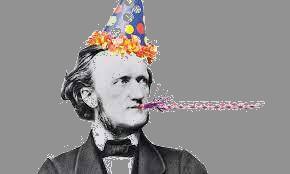
Wilhelm Richard Wagner was born on 22 May 1813 in Leipzig, Germany at No 3, the Brühl (The House of the Red and White Lions) in the Jewish Quarter.
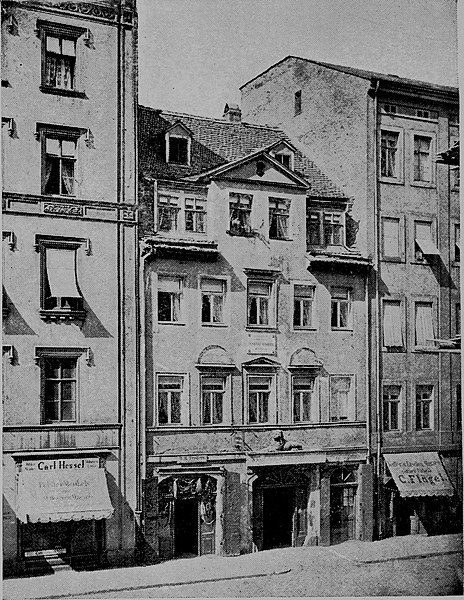
Richard Wagner’s birthplace, No 3, the Brühl, Leipzig
Early birthdays:
From his childhood Wagner had been accustomed to seeing family-life made enjoyable at every opportunity. Long afterwards, he wrote ‘Ah! then one still had household garlands! Then a poem was composed and enacted for every birthday; no festival without its special ode.’
1840: 27th birthday (Paris)
Wagner married his first wife Minna Planer in 1836, and the following year they moved to Riga where he became music director of the local opera. However they fled Riga in 1839, on the run from creditors, and spent the years 1839 to 1842 in Paris, enduring severe poverty.
After nearly a year’s residence in Paris, the clothes he had brought with him from Germany were showing signs of wear. Minna managed to find a German tailor in Paris who agreed to provide her with a suit of clothes for Wagner for his 27th birthday, and agreed to wait for payment until more favourable times. Minna’s gift deeply touched Wagner.
1841: 28th birthday (Meudon, outside Paris)
In April 1841 Wagner and Minna moved from an apartment in the Rue du Helder to an inexpensive summer flat in Meudon for six months, where the debt laws could be more easily evaded.
On 22 May Wagner had a cheerless twenty-eighth birthday due to their lack of funds. The plaque in front of his house quotes him: ‘Sa misère est extrême et il connaît, à Meudon, les mois les plus cruels de son existence.’ [‘His poverty is extreme and he knows, in Meudon, the cruellest months of his existence.’]
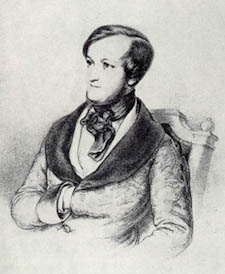
Richard Wagner c 1840
1843: 30th birthday (Dresden)
Wagner left Paris and moved to Dresden with Minna in 1842, where they lived for six years.
Not long after his appointment as Royal Kapellmeister in early 1843, Wagner took charge of the Dresden Liedertafel, at the time the city’s leading male choral society and they sang a serenade in honour of Wagner’s thirtieth birthday. He wrote to his brother Albert: ‘On my birthday, to wit, a grand serenade with coloured lanterns etc. was given me by 60 singers from the local clubs, when a poem was also presented me which they sang to a melody of Weber’s. A thing like that is mighty touching!’
1848: 35th birthday (Magdala)
Following the unsuccessful uprising in Dresden on 3-9 May 1848, in which he played a minor role, Wagner he had to flee to Switzerland.
Following written instructions from Wagner, Minna reached Magdala on 22 May. Having travelled from Dresden via Weimar under a false passport, she reunited with Wagner as he wished to see her before he fled. Wagner wrote that she was ‘bent on persuading him to flee the country immediately and for good. No attempt to raise her to the level of my own mood was successful; she persisted in regarding me as an ill-advised, inconsiderate person who had plunged both himself and her into the most terrible situation.’
1852: 39th birthday (Pension Rinderknecht, Zurich)
Wagner lived with Minna in exile in Zurich from 1849 to 1858. It was in Zurich in early 1852 that Wagner met the rich silk trader Otto Wesendonck and his wife Mathilde.
Wagner and Minna had rented the small but fairly comfortable Pension Rinderknecht, a pied-à-terre situated halfway up the Zurich Berg, in April. They able to enjoy an alfresco meal on his thirty-nineth birthday with a view of the lake and the distant Alps.
1853: 40th birthday (Zurich)
Otto Wesendonck financed a three-day music festival in which concerts of opera excerpts from Rienzi, Fliegender Holländer, Tannhäuser and Lohengrin were held on 18, 20 and 22 May, the last being Wagner’s fortieth birthday.
The birthday concert on 22 May ended with the throwing of wreaths and bouquets, a lady presented him with a laurel wreath which he modestly declined to have set on his brow, a second lady presented him with a silver goblet in the name of the women singers, and a poem of praise of Wagner was recited, which had been attached to one of the wreaths. He responded ‘What great and touching gladness you have given me today.’
He wrote to his niece Clara Brockhaus about his birthday: ‘Had you been here for my last birthday, though, you’d have enjoyed yourself; the music-performances gave even myself great delight, and affection was shown me on all sides that was bound to go straight to my heart.’
1854: 41st birthday (Zurich)
Wagner wrote in his autobiography ‘My Life’: ‘About the time of my birthday I had a visit from my old friend Tichatschek of Dresden, who remained faithful to his devotion and enthusiasm for me–as far as so uncultured a person was capable of such emotions. I was awakened in a touching way by the strains of my beloved Adagio from Beethoven’s E minor Quartette. My wife (Minna) had invited the musicians in whom I took a special interest for this occasion and they had, with subtle delicacy, chosen the very piece of which I had once spoken with such great emotion. At our party in the evening Tichatschek sang several things from Lohengrin, and really amazed us all by the brilliancy of voice he still preserved.’
1855: 42nd birthday (London)
In May Wagner was in London to conduct a series of eight concerts by the Philharmonic Society of London. He received Minna’s congratulatory letter on the morning of his birthday and was pleased to learn that her gift was a dressing-gown of violet velvet, lined with satin of similar colour, with a biretta to match. A banquet was held for him that day.
1857: 44th birthday (a cottage, Enge, Zurich)
From late April 1857 to August 1858, Wagner and Minna lived in an Asyl, a cottage, on the Grüner Hügel (the Green Hill) close by the Wesendoncks’ villa in the Zürich suburb of Enge, which had been offered by Otto Wesendonck.
Wagner recovered from a bad cold in time for his forty-fourth birthday. Sitting on the cottage roof in the evening, he heard one of the songs of the Three Rhine Maidens, from the finale of Rheingold, from across the gardens. He had allowed Frau Karoline Pollert to practise the last act of Walküre, and the Rhine Maidens scenes from the Rheingold, with her two daughters, and frequently in the course of the winter they had given short performances of this music for his friends. That evening, this music made him anxious to take up Tristan again. But first he began to complete the composition of the second act of Siegfried, which had only just been begun.
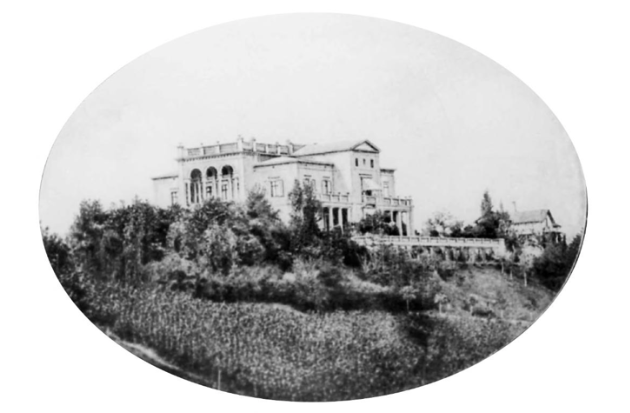
The cottage is on the far right of the Wesendonck Villa.
After Wagner’s affair with Mathilde Wesendonck in 1857, Minna mostly lived apart from him, and subsequent efforts at reconciliation proved ultimately impossible.
1860: 47th birthday (Paris)
Wagner wrote: ‘I passed my forty-seventh birthday in a far from happy frame of mind, to which, however, on the evening of this day, the peculiarly bright glow of Jupiter gave me an omen of better things to come. The beautiful weather, suitable to the time of year, which in Paris is never favourable to the conduct of business, had only tended to increase the stringency of my needs. I was and still continued to be without any prospect of meeting my household expenses, which had now become very heavy.’
1861: 48th birthday (Zurich)
Wagner wrote: ‘As my birthday fell just at the time of this return journey, I resolved to celebrate it at Zurich. … Next morning at early dawn I returned to Zurich. The wonderfully clear air decided me to try the long and circuitous path through the familiar haunts of the Sihlthal to Wesendonck’s estate. Here I arrived quite unannounced; and when I inquired what the habits of the household were, I learned that about this time Wesendonck usually came down to his dining-room to breakfast alone. There I accordingly seated myself in a corner, where I awaited the tall, good-tempered man, who, on entering quietly for his morning coffee, broke out into joyous astonishment on beholding me. The day passed most sociably; Sulzer, Semper, Herwegh, and Gottfried Keller were all sent for, and I thoroughly enjoyed the satisfaction of a well-contrived surprise, under such strange circumstances, as my recent fate had only just been forming the daily topic of animated discussion among these friends.’
1862: 49th birthday (apartment in a villa in Biebrich, near Mainz)
In February 1862, when Wagner was living in an apartment in a villa in Biebrich, Minna made a surprise visit. Wagner referred to this period as “10 days of hell”., and they were never to live together again.
On 22 May Wagner wrote to Mathilde Wesendonck that it was his birthday and someone had brought him flowers. ‘And there I sat alone. Suddenly I had an idea for an orchestral introduction to the third act (of Die Meistersinger).’
He was not left alone for the whole of his birthday. ‘My other acquaintances who lived near my place of refuge in Biebrich were kind and friendly when, on the evening of my birthday …, I entertained this little company in my flat. Mathilde Maier with her sister Frederike and her lady friend were very clever in utilising my small stock of crockery, and in a certain sense she did the honours as mistress of the house’. (Wagner flirted with Mathilde though also having an affair with her sister.)
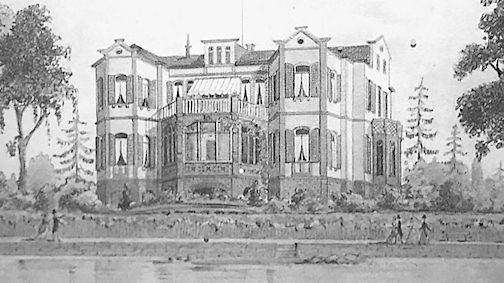
The villa in Biebrich
1863: 50th birthday (his new apartment at Hadikgasse 72, Penzing, Vienna)
By 1863 Richard Wagner and Cosima von Bülow were firmly committed to each other.
Although penniless, Wagner wrote ‘On the 12th of May, in lovely spring weather, I took possession of my pleasant home, and for a while wasted much time over the exciting cares connected with the fitting up of my comfortable apartments. … The grand-piano arrived in due course, and with the addition of various engravings after Raphael, which had fallen to my lot in the Biebrich division, my music-room was completely furnished in readiness for the 22nd of May, when I celebrated my fiftieth birthday. In honour of the occasion the Merchants’ Choral Society gave me an evening serenade with Chinese-lantern illuminations, in which a deputation of students also joined and greeted me with an enthusiastic oration. I had laid in a supply of wine, and everything passed off excellently.’
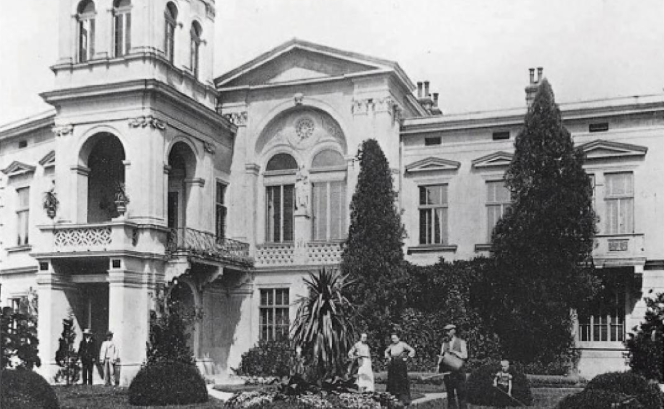
Wagner’s upper floor apartment at Penzing, Vienna
1864: 51st birthday (Villa Pellet on Lake Starnberg, Bavaria)
In 1864, Ludwig became King of Bavaria. Besotted with Wagner’s music, he wanted to become his patron. He paid Wagner’s debts, granted him a yearly income and provided a residence, the Villa Pellet where the composer could live and work undisturbed. Wagner and Cosima had a secret relationship in the summer of 1864 during Wagner’s stay at the villa.
Wagner spent his birthday in solitude, brightened only by the King’s wishes and gifts.
When Ludwig II wished to honour Wagner on his fifty-first birthday, he had commissioned Carl Bechstein to make a special piano. The Bechstein piano had a full keyboard but was designed to sit on top of a desk. It was the one Wagner used to compose Meistersinger, part of Siegfried, Götterdämmerung and Parsifal.
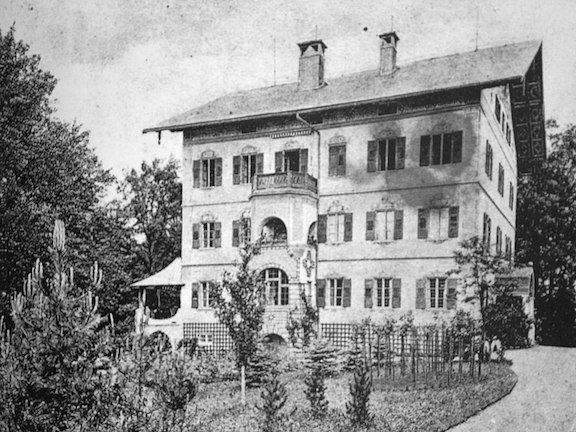
Villa Pellet
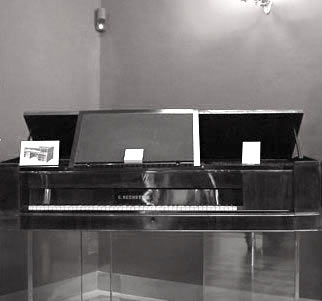
Wagner’s Bechstein piano – a present from King Ludwig II
[On display at the Bayreuth Wagner Museum]
1865: 52nd birthday (Villa, 21 Briennerstrasse, Munich)
In October 1864 a more spacious house at 21 Briennerstrasse in Munich had been made available to Wagner by King Ludwig.
The King gave Wagner the Lohengrin vase on his birthday. [Ludwig had been just 15 and infused by the old German legends when he first saw Wagner’s ‘Lohengrin’. Two years later, Ludwig became obsessed by creating a porcelain vase featuring scenes from ‘Lohengrin’. Leopold Rottmann’s watercolours of the receptacle — the only surviving evidence of what it looked like in full — show that it had four scenes from the opera and a lid and handles in the shape of a swan.]
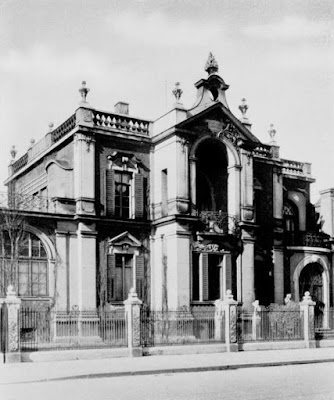
Wagner’s villa in Munich, with its flat Italian roof
surrounded by balustrade carrying stone vessels
[The Lohengrin vase was believed lost after Allied bombing in World War II destroyed much of Bayreuth. But one fragment emerged after the war and was taken to the Belgian capital, Brussels, in 1949, where it largely remained out of sight in the intervening years. The fragment in Brussels shows a gilded swan, the tragic heroine, Elsa, on a balcony, and the two villains Telramund and Ortrud.]
1866: 53rd birthday (Villa Tribschen, Lucerne, Switzerland)
When Wagner was obliged to leave Munich in late 1865, he moved to a spacious villa in Tribschen in Lucerne, Switzerland which was provided by King Ludwig and where he would live for six years. His estranged first wife Minna died that year. In May Cosima von Bülow came to Tribschen with her daughters, but did not stay with Wagner permanently until 1868.
Here a family tradition of marvellous birthday parties was developed.
On 22 May 1866 King Ludwig paid a visit to Tribschen with Prince Paul of Thurn und Taxis to surprise the ‘Dear One’ on his fifty-third birthday. They stayed there incognito at until 24 May.
Some Munich citizens sent Wagner a silver wreath, feeling remorse that they had contributed to driving Wagner out of Munich earlier.
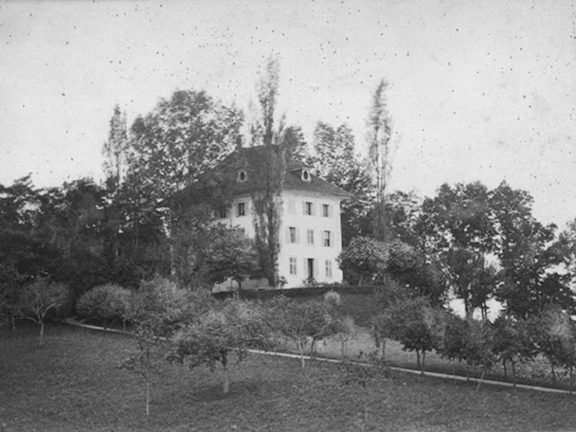
Villa Tribschen
1867: 54th birthday (Starnberg, Bavaria)
The King wanted Wagner to spend his birthday with him at Starnberg and Wagner arrived on the morning of 22 May. In the evening various events were put on, including a concert in the Westendhalle of excerpts from Tannhäuser and Lohengrin, and Das Liebesmahl der Apostel. Public interest was so great that hundreds had to stand in tight-packed rows.
1869: 56th birthday (Villa Tribschen, Lucerne, Switzerland)
Cosima and her daughters came to live with Wagner permanently in November 1868, and they married in 1870 following her divorce.
The night before Wagner’s fifty-sixth birthday, Cosima set up his bust surrounded by flowers.
At 6am Hans Richter blew Siegfried’s horn call loudly outside Wagner’s bedroom. The children stuck candles on his bathtub and surrounded it with wreaths and bunches of flowers. When Wagner came down to breakfast, he found his room turned into a flower garden. The four children, who were lined up as heralds of peace from Rienzi, approached him with palm branches in their hands, and the two eldest recited old Greek poems in celebration of Spring. Presents were laid out, including those from King Ludwig.
Cosima had arranged for Richter and the Maurin-Chevillard String quartet from Paris to come and play at 10.30am. Wagner was very surprised and delighted. In the course of the day they played Beethoven’s late string quartets B-flat Major (Grosse Fuge), A Minor and C-sharp Minor (op. 133, 132 and 131). Telegrams came from the King and from Hungary.
1870: 57th birthday (Villa Tribschen, Lucerne, Switzerland)
During the night before Wagner’s fifty-seventh birthday, Cosima decorated the stairs and the vestibule.
At 8am she and the children who were dressed alike in white, with wreaths of roses in their hair, were stationed at different places to represent living flowers: Isolde and Eva at the front door; Blandine farther down in the bower, beneath a laurel; Cosima with Siegfried on her lap at the bottom of the steps, beside the bust loaded down with flowers; and Daniela at the end of the tableau. At 8.30am Huldigungsmarsch (which Wagner had composed to celebrate the birthday of Ludwig II on 25 August 1864) was played by 45 soldiers – from the barracks in Lucerne – grouped under the fir tree, instead of the one horn played by Richter. Deeply moved, Wagner emerged sobbing from the house and thanked the conductor. Next Daniela went to her birdcage which had been given to her on her birthday in October and, after reciting a poem written by Cosima for the occasion, set her pets free. Afterwards the children recited poems to him, they all breakfasted in gay spirits and then went off to rest.
Wagner also received many letters and telegrams including those from the King, Richter and Josef Standhartner, a poem from Hans Herrig (The Three Norns), a letter from Friedrich Nietzsche which closed by stating that his whole life was dedicated to his ‘esteemed Master’ and a telegram from Franz Liszt (‘Forever with you, on bright as on gloomy days’).
1871: 58th birthday (Villa Tribschen, Lucerne, Switzerland)
As part of the celebrations for Wagner’s fifty-eighth birthday, Cosima put on the costume of Sieglinde, Daniela was dressed as Senta, Blandine as Elisabeth, Eva and Isolde as their namesakes, while, as Sieglinde, she carried the boy Siegfried in her arms. Wagner was deeply moved. In the afternoon Nietzsche came and discussed with him the founding of a periodical, which was to be called the Reformationszeitschrift and was to appear in two years’ time. The King, too, sent a warm and cordial telegram.
1872: 59th birthday (Hotel Fantaisie, Donndorf, Bayreuth)
At 11 o’clock in the morning in pouring rain, on his fifty-nineth birthday, Wagner laid the foundation-stone of the Festspielhaus, a new theatre atop a large plot of land outside Bayreuth – the ‘Green Hill’ – which had been donated by the town council. King Ludwig sent a good-will message that was enclosed in the foundation stone. Then the band played his Huldigungsmarsch while Wagner struck the stone three times with a hammer and said, ‘Bless this stone! May it stand long and hold firmly.’ Because of the rain, the assembly returned to the Margraves Opera House to complete the ceremony. Musicians and singers, the Wagner family, the composer, the burgomaster and others were grouped on the stage. The burgomaster delivered an address of welcome, and then Wagner read a fervent speech. At the close of it he raised his hands and the chorus burst into the chorale from the last scene of Die Meistersinger.
At 5.00pm, Wagner conducted a performance of Beethoven’s Ninth Symphony in the Opera House, together with his own Kaisermarsch. He had assembled an orchestra of over one hundred musicians from all over Germany and a chorus of three hundred, and special staging was erected.
Following the concert, some three hundred guests of honour were invited to a celebratory banquet.
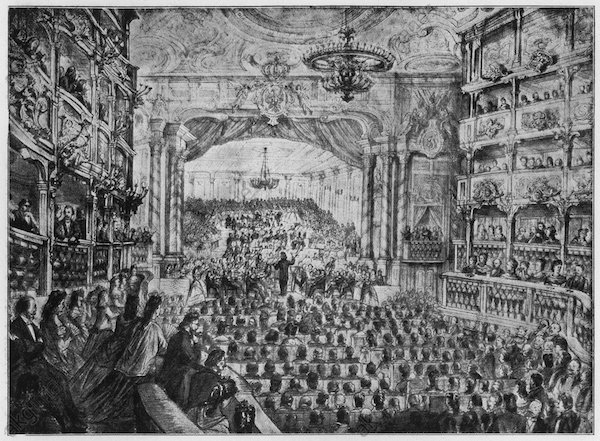
Wagner conducting Beethoven’s 9th Symphony
at the Margraves Opera House in Bayreuth in 1872.
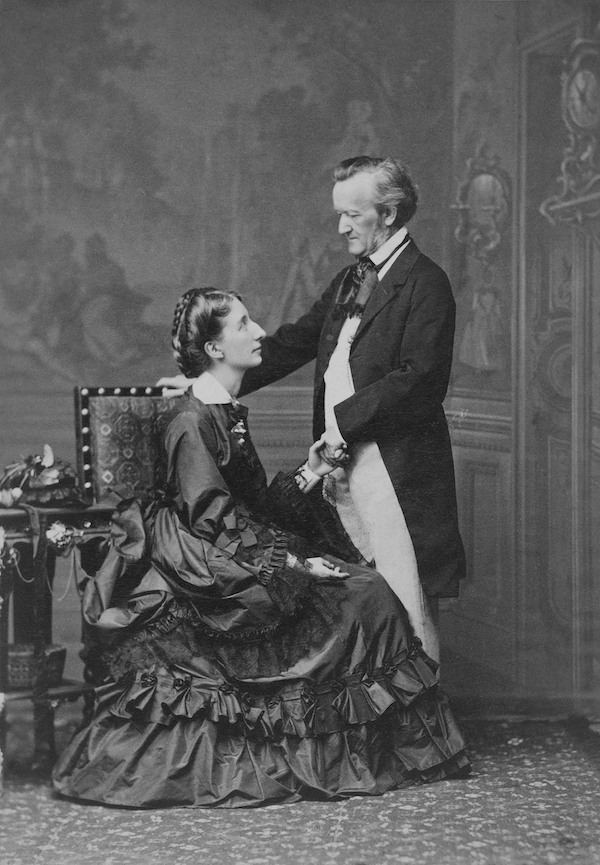
Cosima Wagner and Richard Wagner in 1872
1873: 60th birthday (an apartment at Dammallee 7, Bayreuth)
In the early morning Wagner was awoken with the chorus ‘Wach auf, es nahet gen den Tag’ (Awake, the day is dawning now). Daniela carried in the Laurana Gallery etchings of Raphael, drawings which Wagner had once seen and admired at the home of the painter Hubner; Blandine presented l’Histoire du Bouddhisme by Burnouf; and the two little girls (Isolde and Eva) gave him Le Roman de Douze Pairs from Wagner’s former library. Cosima gave Wagner Alexandre Langlois’ translation of the Rig-Veda and Wagner treated himself to translations of a number of other oriental classics.
The most important celebrations, arranged by Cosima, took place in the Margraves Opera House. The evening included Wagner’s Concert Overture No. 2 in C major of 1831, his Albumblatt and his arrangement for violin and orchestra of Traüme from the Wesendonck Lieder. The comedy The Laughter of the Innocents, which had been written by his stepfather Ludwig Geyer, was performed by the company temporarily in residence. Wagner was greatly touched by it. And Peter Cornelius was commissioned to write a play which he called An Artist’s Dedication in which the painter Genelli introduced the youthful Wagner to the Dramatic Muse. The play was set to the incidental music Wagner had composed in 1835 – Neujahrs-Kantate, for chorus & orchestra, WWV 36 – for Beim Antritt des neuen Jahr, an allegorical festival play in one act which had been written by Willhelm Schmale.
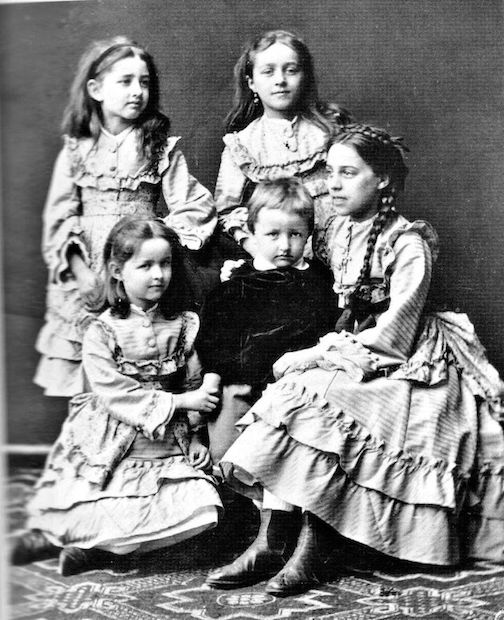
Wagner’s children and stepchildren c1873:
L-R, top row: Isolde von Bülow (b. 1865 – Wagner’s daughter, while Cosima was still married to Bülow)
and Blandine von Bülow (b. 1863 – Wagner’s stepdaughter)
L-R, front row: Eva von Bülow (b. 1867 – Wagner’s daughter, while Cosima was still married to Bülow),
Siegfried Wagner (b. 1869 – son of Wagner and his future wife Cosima)
and Daniela von Bülow (b. 1860 – Wagner’s stepdaughter)
1874: 61st birthday (Villa Wahnfried, Bayreuth)
Wagner’s sixty-first birthday was spent in their new home, a large house in Bayreuth, which he named Wahnfried (“madness” + “peace”) and which the family had moved into in April. It had been financed by King Ludwig.
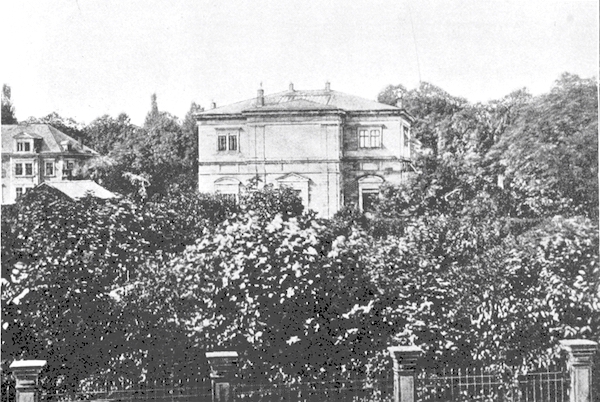
Villa Wahnfried
1875: 63rd birthday (Villa Wahnfried, Bayreuth)
For Wagner’s sixty-third birthday, the bust of Wagner in the middle of the hall at Wahnfried was surrounded by all the plants from the greenhouse. In front of the bust were Siegfried as Faith, in a blue mantle with sword and palm, on the right-hand side Isolde as Love, in a red robe with roses in her hair, holding out her hand in blessing over the bust, and on the left Eva as Hope, in green and white with her head leaning against the bust and an anchor at her side. They recited verses for Faith, Love and Hope.
Then a military band played the Huldigungsmarsch. Eva and Isolde wept with emotion.
1877: 64th birthday (London)
The Wagners were in London from 1 May to 4 June 1877 for six (extended to eight) concerts at the Royal Albert Hall, which were hoped to recoup losses from the first Bayreuth Festival the year before. The Royal Choral Society (comprising almost a thousand singers) celebrated Wagner’s sixty-fourth birthday with a banquet in the Albert Hall. Women however, including Cosima, had to watch from the gallery apparently.
The following evening, Dr William Siemens (electrical engineer, businessman and Fellow of the Royal Society) arranged a small dinner for Wagner at the Athenaeum (a private members’ club in London).
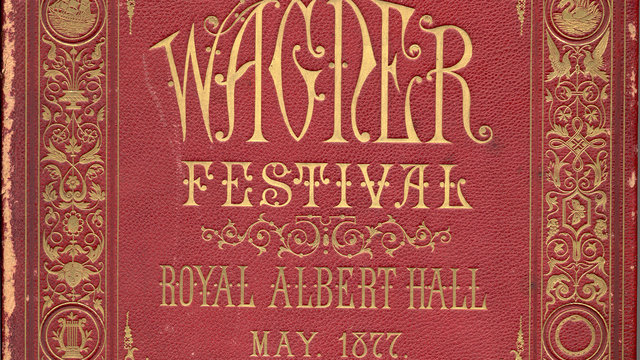
The Wagner Festival, Royal Albert Hall
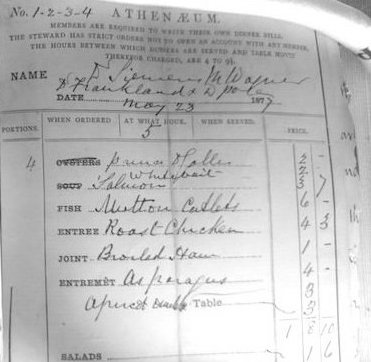
Record of the dinner at the Athenaeum
1878: 65th birthday (Villa Wahnfried, Bayreuth)
Cosima wrote in a letter to Malwida von Meysenburg that Wagner’s birthday was ‘so full of the Wahnfried spirit (wahnfriedlich) that it will always remain in our memories. It was an old idea of mine to have the four divisions of the day, the seasons, elements, and continents doing homage to the occasion; and Wolzogen grouped these most beautifully round the awakening, lamentation, and rejoicing of Erda, with a prelude of the Norns as introduction, and my children performed the little festival play in the hall in a really incomparable fashion. All their love for their father and their consciousness of his greatness shone in their eyes and in the seriousness of their voices and gestures. It was inexpressibly touching, especially in the pantomime in which Morning, Noon, Evening, and Night moved in procession round Richard’s bust, to appropriate music from his works, saluting it and invoking blessings upon it. When you are here, I will show you the words and pictures of it. Daniela declaimed the part of Erda really surprisingly beautifully, with warmth and enthusiasm, and while these moving testimonies of love came from all sides, we silently enjoyed a happiness beyond compare, intimate and pure, which showed itself in tears.’
1879: 66th birthday (Villa Wahnfried, Bayreuth)
Cosima had arranged for a number of living pictures to be represented for Wagner’s sixty-sixth birthday. One was Siegfried standing in front of Franz von Lenbach’s portrait of Cosima – her present to Wagner; he was pretending to be painting it, dressed like Father Geyer and with his hair arranged in the same way as his. Later, extracts from Richard’s works were played in the Hofgarten. At dinner Siegfried proposed cheers for his father and Richard was delighted with the children’s song.
On the following morning, the first and second acts of Parsifal were played to the guests, and on the 24th came the third act as well.
In addition to her portrait, Cosima had ordered a pink carpet crafted from flamingo breast feathers with a border of peacock blues for her husband’s birthday.
1880: 67th birthday (Villa d’Angri in Posillipo, near Naples)
While the family were at Villa d’Angri in Posillipo for Wagner’s health, his sixty-seventh birthday was celebrated with a magnificent banquet, an excursion in boats on the Gulf and a performance of the Grail scene from Parsifal by Engelbert Humperdinck (who was visiting), Joseph Rubinstein and Martin Plüddemann with the four Wagner daughters Daniela, Blandine, Isolde and Eva (who had been rehearsed by Humperdinck). The audience consisted of Wagner, Cosima, Siegfried, Malwida von Meysenburg and Paul von Joukowsky.
In addition, their 15 year old daughter Isolde had wrapped 67 pots of rosebushes in paper, on which she had painted pictures in watercolour depicting an event for each year of his life, to celebrate his sixty-seventh birthday. Wagner was delighted.
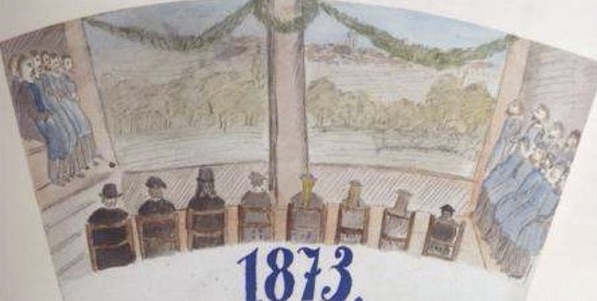
Isolde’s picture for 1873: The Festspiel Foundation Ceremony –
Richard, Cosima, Liszt, Daniela, Blandine, Isolde, Eva, Siegfried
[Isolde’s water-colours were recently rediscovered in the Wahnfried archive,
and were published in book form by Isolde’s grand-daughter Dagny Beidler,
in Richard’s bicentenary year 2013.]
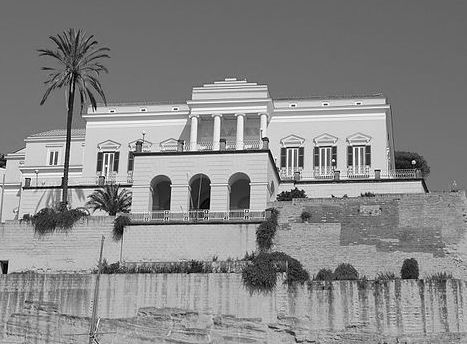
Villa d’Angri
1881: 68th birthday (Villa Wahnfried, Bayreuth)
At 8am on his sixty-eighth birthday, Wagner was given the Flower Greeting by the children in flower costumes, and a clock presented by his son Siegfried. Cosima had had his library ceiling decorated with the coats of arms of the Wagner Society towns. Wagner then strolled to the summerhouse with Cosima, and they exchanged gold pens and little poems.
Lunch included guest of honour Count Arthur Gobineau, who made a five-week visit to Wahnfried, Siegfried reciting a poem by Heinrich von Stein (Siegfried’s tutor) proposing the health of eternal youth, and then daughter Elsa sang Nicht Gut noch Pracht from the gallery above. Over coffee Faf from the Festival Theatre appeared with the program for that evening on his back. The children acted out the little farces by Lope and Sachs, and Daniela recited Wolz’s linking epilogue. At the conclusion of the Sachs play, Rubinstein linked the Prelude to Die Meistersinger. When Wagner went into the salon, the children, in different costumes, sang his Gruss der Getreuen. At the conclusion of the evening, after the meal, came the Kaisermarsch with altered text.
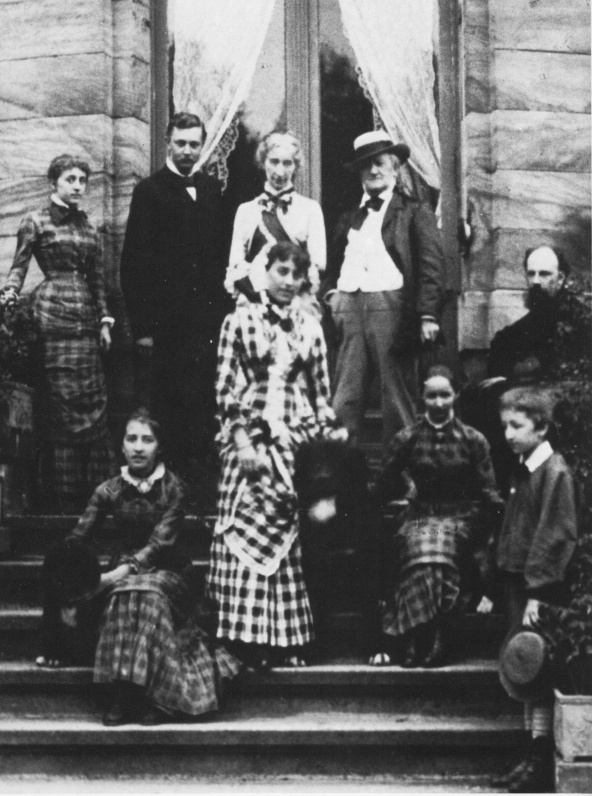
Above: Richard Wagner and family in front of Villa Wahnfried in 1881:
L-R, top row: Blandine von Bülow (Wagner’s stepdaughter), Heinrich von Stein (Siegfried’s tutor),
Cosima Wagner, Richard Wagner, Paul von Joukowsky (family friend)
L-R, bottom row: Isolde von Bülow (Wagner’s daughter), Daniela von Bülow (Wagner’s stepdaughter),
Eva von Bülow (Wagner’s daughter) and Siegfried Wagner (Wagner’s son)
1882: 69th birthday (Villa Wahnfried, Bayreuth)
At Wagner’s sixty-nineth and last birthday, the boys’ choir rehearsed and conducted by Humperdinck sang the last chorus from Parsifal, Act 1. A piece by Cervantes was also performed, followed by the Liebestod, with Engelbert Humperdinck and Ernst Hausburg playing the scherzo from the Ninth Symphony behind the scenes between the two pieces. Count Gobineau was again guest of honour at Wagner’s birthday party.
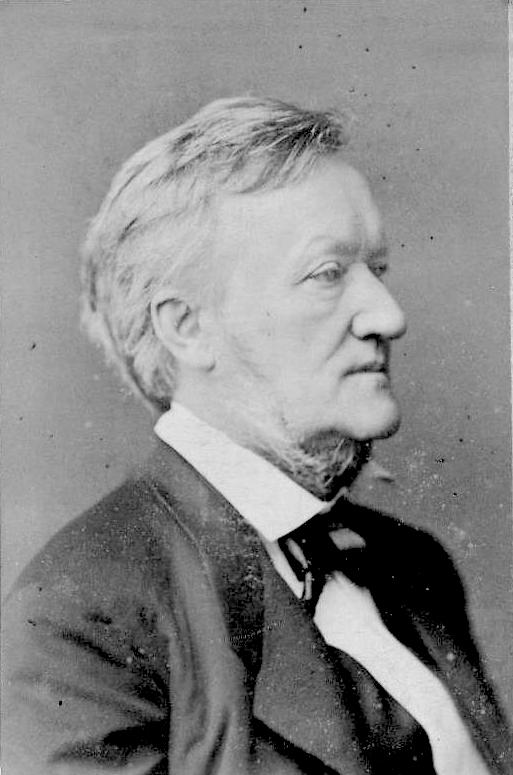
Richard Wagner c 1880
